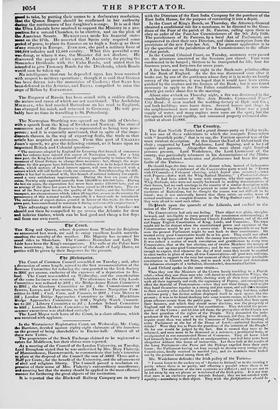The Norwegian Storthing was opened on the 20th of October,
with a speech from the King of Sweden and Norway. The state of commerce and of the finances is represented as being very pros- perous; and it is especially mentioned, that in spite of the impe- diments thrown in the way of exporting deals, the trade in that article has acquired an extension. From this part of CHARLES ?oases speech, we give the following extract, as it bears upon an important British and Colonial question- " The measures adopted by England fur favouring that branch of commerce with her colonies have injured this source of Norwegian trade. Fur a long time past, the King has availed himself of every opportunity to induce the Go- vernment of Great Britain to change those measures: but, though the nego- tiations for this purpose have hitherto been fruitless, it is to he hoped that those effiats, which motives of local interest oppose, will soon be crowned with a 311CreSS which will still further vivify our commerce. Notwithstanding the diffi- culties it has had to contend with, this blanch of national industry has experi- enced a very satisfactory improvement. During the first six years of the anion, Norway only exported annually from 120,000 to 160.000 lasts. During the last six years, the exportation has never been under 170.000 lasts, and on an average of the three last years it has been raised to '214,000 lasts. The ex- tent of the Norwegian forests, the quality of the timber, and the facilities of taansport, are circumstances which, taken all together, assure to thecountry the permanency of this national wealth, especially if a forest-code be introduced. Tha reductions of export-duties, granted in favour of this trade; for these ten Mara past, have contributed to maintain it during trufavourahle conjunctures."
This advantage would arise from a rupture with Canada—we should not then be compelled to go across the Atlantic for dear and inferior timber, which can be had good and cheap a few days sail from our own coast.


























 Previous page
Previous page